Looking into the Future of Marketing and Sales
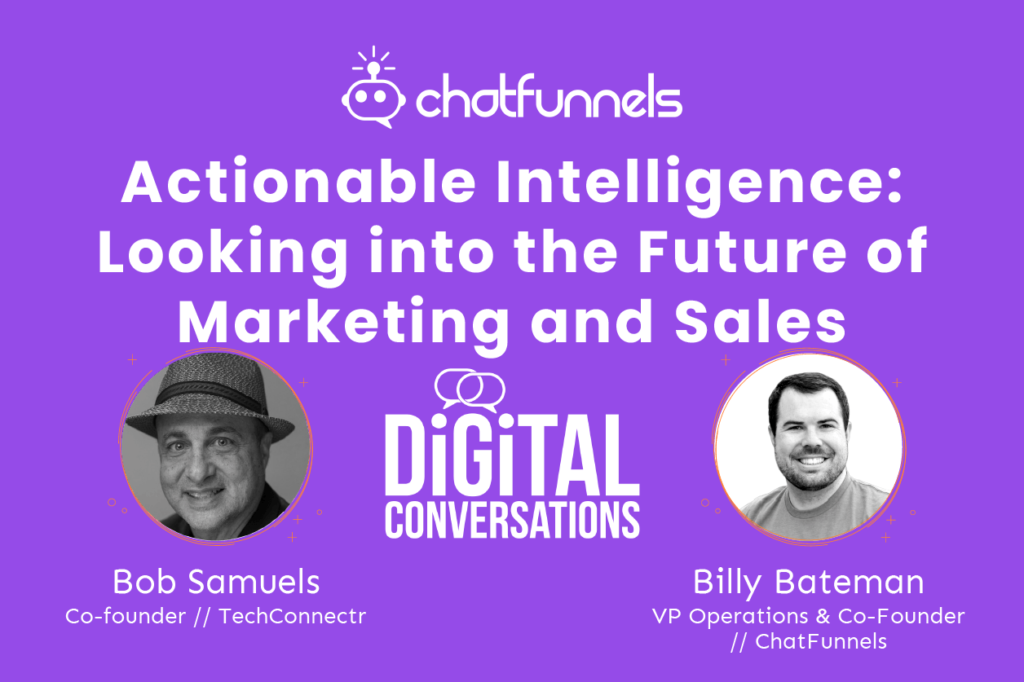
Overview
Bob Samuels shares his experience and insights on actionable intelligence. He discusses how to understand, organize, and strategically sort through intent data. Lastly, he comments on ABM and the future of B2B lead gen.
Guest
Bob Samuels started his career in finance and accounting. After working as a CPA for 20 years, his path eventually led him to marketing through a B2B Lead Gen company. He is the co-founder of TechConnectr, a B2B performance marketing advisory firm.
Reference
Intro
Billy Bateman 0:01
All right, everyone. Welcome to the show today. Today I have the pleasure of being joined by Bob Samuels, co-founder and CEO of tech connector, Bob. Thanks for joining me, man.
Bob Samuels 0:12
Hey, happy to be here, Billy, how are Ya?
Billy Bateman 0:15
I’m excited. I’m excited this will be a fun conversation. But before we get into it, you know, for people that don’t know you and don’t know about tech connector, give us a little intro to who Bob Samuels is and what you guys do at TechConnectr?
Bob Samuels 0:29
Sure, thank you for asking. So, I co-founded Tech Connect about four years ago, I’m a finance guy from way back, I graduated with an accounting degree of a CPA 20 years of accounting and budgeting and, and analysis and so forth. And then I about 20 years ago, I got into the b2b lead gen space company called NetLine, which is still around today it was a young puppy, then now it’s a 20-year-old company. But it was very smart. And we did lead gen.
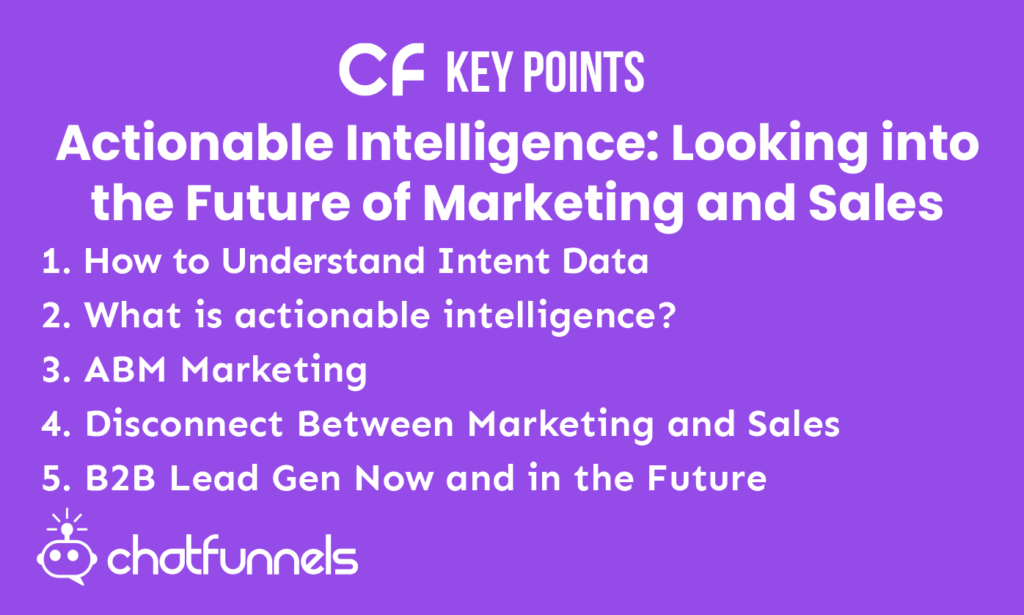
Early on, we did content syndication, which is a little bit different than now. Now, things have changed quite a bit in the last 20 years. Yeah, I can share with you about that. But we you know, we did lead gen for b2b, we started off with getting qualified subscribers for controlled circulation publications. So, we would work with magazines, like real magazines, like they were they used to printing them and yeah, the entries and
Billy Bateman 1:32
yeah, I used I used to get my outdoor life and my, my sports illustrated in the mail and no more,
TechConnectr
Bob Samuels 1:39
no more, no more. So, you know, we work with, you know, you know, InfoWorld and tech, tech magazines, and getting them subscribers that are qualified, and through the internet. And so, and then we switched, where some of the advertisers in the magazines like Oracle, or SAP or whatever, say, hey, if you can get qualified subscribers for these guys, for, you know, can you get us qualified prospects started promoting white papers in syndicating, getting people to sign up for webinars and so forth.
And so, so you know, that we got into some into my job, you know, I switched from being the CFO to being head of performance, because I didn’t want to sit in the back and count beans. Yeah, I wanted to be in the front and affect revenue and affect performance. And so, I made that shift pretty early on. I’ve enjoyed doing that ever since.
The Shift to B2B Marketing
So, I left I was there about 10 years went to set sail defy which got bought by Ziff, Davis, some other big b2b Legion companies. I was in charge of performance, excuse me, partnerships. Actually, before that, I was at Quin Street, which is a b2b publisher. And we did lead gen and accounting, excuse me, display advertising for Tech marketers. So, it’s in charge of partnerships there. And so, by being involved with partnerships, I got to learn who the key players are, and who are the other big, smart lead gen companies and I partner with them. And, you know, they would help me fulfil campaigns, I could help them and so forth.
So, with tech connector we founded four years ago, it’s a, it’s a fully transparent, best of breed marketplace of legions, solution providers, and data providers. Because we’re finding more and more that data and intelligence is super important. So yeah, we’re merging quite a bit. So, we have a marketplace of over 100 Different lead gen companies, publishers, and email marketing companies and telemarketing companies, and data providers and so forth. And we help clients figure out who to work with. And subsequent to that, we developed a platform where we can manage campaigns.
So, everything from Philip figuring out, you know, the targeting, to putting together request for proposal, sending it out, selecting the different solution providers, communicating with them, managing the campaigns, and then dealing with the leads and validating them and scoring them and verifying and routing and all that stuff. Awesome. Yeah. So, it’s been fun.
Billy Bateman 4:31
Ya know, that that’s, that sounds like fun. So, what we want to talk about, we, you know, hey, what are we going to talk about if we do this podcast and like, right off the top, you’re just like, actionable intelligence. And I love the topic. Because just as you mentioned, you know, data and intelligence becoming more and more important in the marketing and sales function, but, you know, I get, I’d say at least five if not 10 emails, A Day, with people trying to sell me intent data or a list or some type of information for our marketing and sales team.
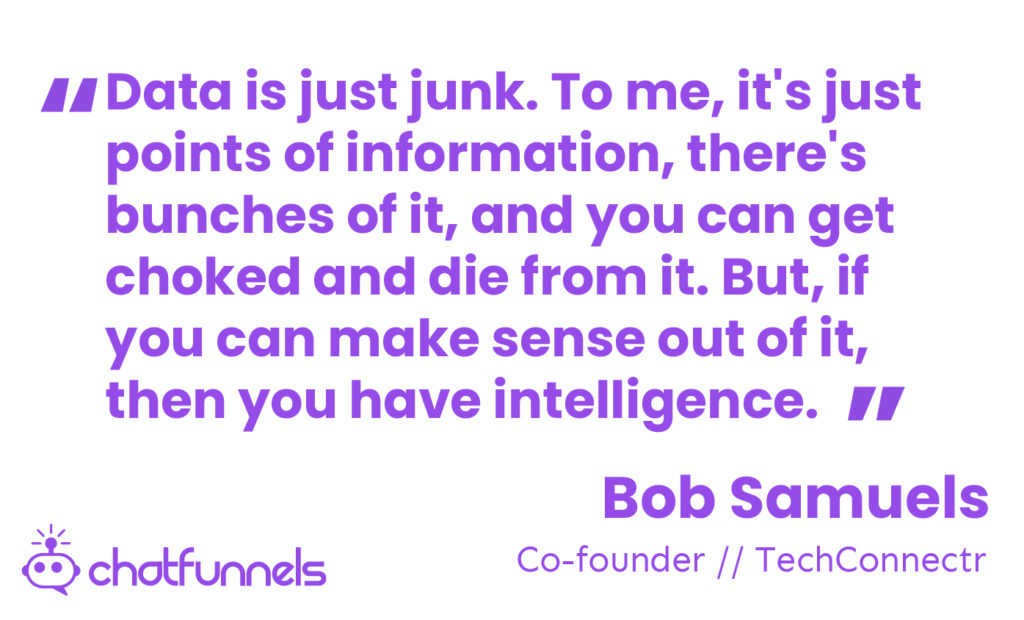
And, you know, usually I just mark it as junk because it doesn’t seem that legit. And I feel like there’s a lot of noise, you know, everyone says, oh, we’ve got the right data for you, that you have the right data, it’s gold, but I feel like most people, it’s, it’s not telling the whole story. So, to you, what is actionable intelligence?
Actionable Intelligence
Bob Samuels 5:32
Yeah, that’s a great question. And, and like he said that, you know, the, the new buzzword these days is, you know, intent data, right? I always put my air quotes with it, because, you know, it means different things to different people and how valuable it is, it’s, it’s questionable, quite frankly, a lot of it. But, you know, conceptually, I love the concept of learning and being smart about who you reach out to out who’s best to, you know, it’s, you might as well talk to people that are valuable to talk to, rather than just randomly pick people.
So doing your homework and, and figuring out, so part of the intelligence is market intelligence and some of its competitive intelligence, and some of its account intelligence. And some of it’s down to the very specific person that you’re going to be dealing with. So, whoever was dealing with you with all those emails, they may have done a great job of targeting you, or personalizing it, because if they did, they could have said, hey, listen, I know about you, and I know what you do, and I know your target audiences. And I know, you know, what your challenges are, what their challenges are, and, and I can help you reach them maybe, or, and here’s this data that can help you or whatever.
But to me, there’s, you know, there’s data is just junk. To me, it’s just points of information. And there’s bunches of it, and you can get choked and die from it. Because just because it’s just overwhelming. But if you can make sense of it, then you have, then you have intelligence. And, and so you can cluster it, and you can figure out patterns. Then you can figure out outliers and so forth. And then if and then if you can, yeah, and then if you can make the intelligence useful, where you can actually do something with it and actually, you know, affect your sales pipeline, which is really, you know, my clients, that’s what their purpose is, then that’s, that’s the best thing.
Validating Intelligence
So, if we can help them take their intelligence and triangulating or validated against third party information, we can help them figure out what’s the right messaging they should put out to the two different aspects, different audiences, help them figure out what audience is best to go after? And what should they be talking about? Because what’s going to be the pain points? Or what are the challenges for those, those people based on?
And, you know, and again, the usually intelligent, you know, the intent data out there. It’s often like what people read maybe if I read an article six months ago on something, then that’s it. But it’s like, it’s old news right now. Um, maybe. And so, and, and I read lots of things.
And so, what and, and a lot of the intelligence is not down to the specific person, it’s only down to an IP address so that you know, someone at that company at that IP address, read some article about this, but it may have been the chief bottle washer that read it, not necessarily the people that really want to talk about so. Yeah. Well, to get the intelligence down to the specific people is, is more actionable. If you can get it down to a specific company, of what their leads are, it’s more actionable. If it’s just in information, it’s okay. But it’s not something that can be turned into sales or active prospects.
Billy Bateman 8:47
Yeah. How do suggest like getting it down to, hey, this is the person or the department that you actually care about doing this research? Because, like, we just brought a couple new sales guys on one had been using an intent data tool, his previous job, and he said, you know, what, I always found it was a couple steps behind, like, if it said, like, this company’s probably buying, like they’ve already bought, you know. How do you get it down to knowing this is the right person or the right group of people showing this intent?
Intent Data
Bob Samuels 9:26
Right, exactly. And that’s, it’s pretty tricky. So, we work with a company called Vera Insights. They’re, they’re a market research firm, kind of like Gartner. Okay, and so they’ll do, they’ll do first party surveys, they’ll do first party interviews, and they’ll actually talk to prospects. They’ll talk to customers, they’ll talk to competitors, they’ll talk to market makers, and they’ll figure out you know, what, what are people talking about, what are the challenges and so forth?
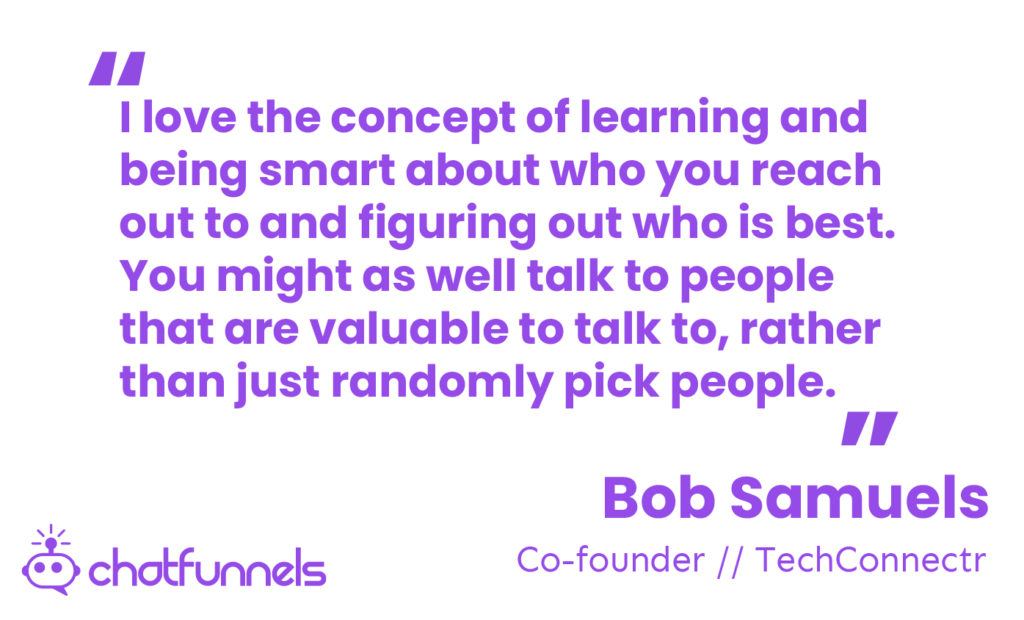
And they’ll do surveys and gather a lot of information direct from the audience that’s of interest. And so just getting into and sitting down to talk to people, I guess is, you know, that’s one way to do it. But there are some, there’s databases out there. They probably sent you emails. But yeah, there’s information on different people in titles and stuff, but I don’t generally go with that.
Billy Bateman 10:26
Now, a lot of ABM marketing seems to like, at least expound, like some level of intent included in their products. But what do you think about ABM marketing? Bob?
ABM Marketing
Bob Samuels 10:39
Well, I mean, as far as you know, ABM is another good big buzzword, right? So yeah, 80s there’s big data was a big buzzword away, back and cloud and so forth. So now, it’s known its intent data and ABM. ABM is it’s, you know, it’s a new buzzword newer. But it’s, it’s all, you know, it’s basically target, you know, target accounts. Yeah, that’s, that’s, that’s all that’s been around since way before it was called ABM. But basically, you know, I think it’s smart to go after the right accounts. The ones that have the highest propensity for success.
And so, what does that mean? And so, you can get into analysis, you know, so do they have enough money to spend? Are they the right, they the right audience? So they’re the right, you know, what are they what are they currently using, so all of that information, but the bottom line is, you know, I think ABM you have to go after named accounts, or, or, or, you know, look alkies, if you will, you know, target accounts is a smart thing to do, because it’s, it’s a lot better to go after, you know, the companies that you’ve identified as being worthwhile than then not. And so, it’s a good idea.
It’s just overused sometimes. There’s different tools, you know, people think that if you buy certain technology. then you’ll have your ABM solution, which is, which is a mistake. I mean, just, it’s not something that’ll work like that. Most of most of the work is upfront, and most of it is boring, but it’s the research, it’s the intelligence upfront, first, figuring out what to go after. And so, for then putting together the proper messaging, you know, the messaging needs to be, you know, very specific to that person, ideally, that it resonates with them. And it makes sense for them, and it’s the right timing, and so forth. So, again, I attribute a lot of the success of that to be upfront intelligence.
Billy Bateman 12:42
I think ABM like, it sounds like what you’re saying is, it’s only part of the solution to really selling this and, and, and I agree with you, like, it’s good to do. But when I’ve been talking to people, and even our own customers, like, you know, they’ve got an ABM solution. But it seems that there’s often a disconnect between marketing and sales, on ABM, have you? Have you found that in your experience?
Disconnect Between Marketing and Sales
Bob Samuels 13:12
Yeah, absolutely. So, and, and, you know, when, when they when marketing sales, speak well, it works out really well, because they can complement each other because the salespeople are talking to people on the ground. Marketing is generally more general, but getting more of a picture of the, you know, the big picture of the whole market, and the competitors and so forth.
And then the sales are more very specific down to very specific cases. They each have their, their perceptions, and there, their filters. Put together it’s a very nice story where you can, you can, you know, validate a lot of the market information with real life cases of, of the clients and likewise, can validate the feedback from the salespeople about the clients with the general market. So, if you can, and then if you can combine that with third party intelligence, then you can really make a nice story out of all those pieces.
Billy Bateman 14:09
I like it, man, I like it. So, what do you think the current state of b2b Lead Gen is and where, where are things headed?
Where are things headed?
Bob Samuels 14:19
Well, yeah, back in the day, again, you know, 20 years ago or so. Back then it was just content syndication, you put you put content out there and whoever grabbed it, you would get, and you would filter out most of them because you don’t really want most of those people probably, yeah. Today, it’s more targeted. Usually, you know, you send out emails or, or telemarketing, whatever and you’re, you’re only reaching the people you want. And then say you’re not filtering out to people you don’t want Cuz you’re starting with the people that you want.
They don’t necessarily want you. Yeah, that’s what you need to get to, and you need to fit you know. So ideally, you can figure out who you want figure out how what they want and explain to them why they should be wanting you. So that’s you know, using that intelligence is where I think it needs to head. The other side of Legion today is there’s a race to the bottom as far as price. General, lead gen is kind of a commodity, and everybody’s doing it now, everybody can do it. Then then there gets to be a price a price race to the bottom. Then race to the bottom potentially as far as quality too.
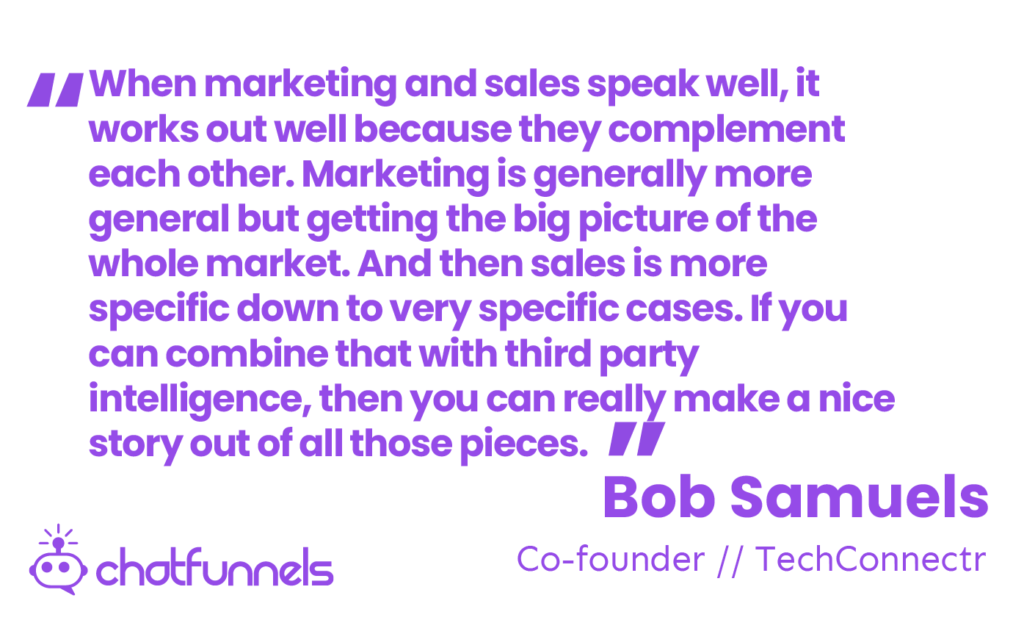
So, we’re trying to change that and go race to the top as far as quality goes. And the cost per lead, maybe higher, but the cost per opportunity, and the cost per sale is going to be much lower. So, we’re, we’re, we’re wanting to, I’m hoping that the industry will want to change from measuring success, measuring performance on a cost per lead basis as you move toward a cost per opportunity. Because if you can deliver only opportunities, the cost per is going to be much higher. But overall, it’s going to be much lower costs. In general, first, you’re not dealing with a lot of crap, you don’t have, you know, expenses dealing with what the bad leads. If you are on the bad path, so the more targeted it can be, then it can warrant a higher price.
Billy Bateman 16:26
Oh, I get mad I would. I think almost any business leader is more than willing to pay for a real sale up, as opposed to just leads. Your sales guys will be the first ones to tell you these leads suck. Whether that’s true or not, you know, there’ll be the first ones to say, yeah, these are not good leads, where they’re coming from your own team or somebody else. So, I love it, Bob. Dude, this is this has been really insightful. Tell me if people want to get a hold of you and continue the conversation? What’s the best way for them to reach out?
Contact
Bob Samuels 17:04
Oh great. Yeah, so I have my LinkedIn, if we can share that you want me to talk? So, my, you know, so Bob, Sam is on LinkedIn, Bob at Tech connector comm you know, at Tech Connect or Twitter. All works.
Billy Bateman 17:22
Yeah. And you guys usually put a monthly webinar.
Bob Samuels 17:25
Hey, so we host you know, ABM Leaders Group and yeah, it’s a nice thing similar to what you do, I think so. It’s, it’s a great way, you know, it’s talking to people that are really smart in marketing. And, and it gives people a chance to share best practices and, and share ideas. It started off, you know, with the pandemic, and just everybody helping each other out, getting through it.
And, you know, it’s been really good people love to share we had earlier this month, we had Bill Doyle from SAP Leslie from avanti, Erica from Cisco, and Angele from Gigamon. So, they got they had a great time. And, you know, they learned a lot, they shared a lot, and the audience learns too so. So, it’s called ABM Leaders Group, and I’ll be glad to hook people up to that. I’ll invite you to join and be part of us of a panel discussion and maybe have an interview like this. I think they’re both worthwhile.
Billy Bateman 18:27
Yeah, love to do it. And I’ve watched a couple of the panels, they’re good. Anybody interested in learning ABM or just getting some more exposure to what people are thinking about? Hope you give it a watch. Is it a great, great resource you guys provide? So, with that, Bob, thank you so much. And we’ll chat later.
Bob Samuels 18:47
Excellent Billy. It’s a pleasure. Thank you very much.
